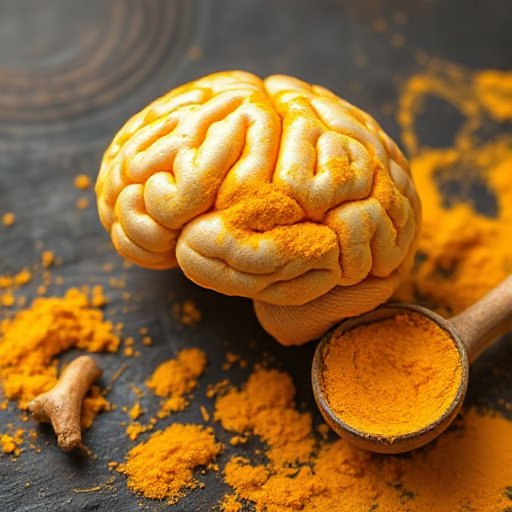What are the Collagen-rich foods?
Collagen is a body-produced fibrillar protein that gives elasticity and…

If you didn’t already know, turmeric isn’t just a vibrant spice that adds color and flavor to your meals—it’s a natural powerhouse for brain health and inflammation reduction. For centuries, turmeric has been a staple in Ayurvedic medicine, revered for its healing properties. Modern science now backs what ancient practices have long understood: turmeric, and more specifically its active compound curcumin, can profoundly impact both physical and mental well-being.
Let’s take a closer look at how this golden spice supports brain health, fights inflammation, and helps maintain mental clarity.
Curcumin: The Brain-Boosting Compound
Turmeric’s primary active ingredient, curcumin, is responsible for most of its health benefits. What makes curcumin so special is its ability to cross the blood-brain barrier, allowing it to directly impact brain cells and provide protection against damage.
Key Benefits for the Brain:
Reduces Oxidative Stress: Curcumin neutralizes free radicals that cause oxidative stress, protecting neurons from damage and aging.
Fights Inflammation: Chronic inflammation in the brain has been linked to cognitive decline, Alzheimer’s disease, and mood disorders. Curcumin reduces inflammatory markers, creating a healthier environment for brain cells.
Promotes Neurogenesis: Curcumin boosts levels of Brain-Derived Neurotrophic Factor (BDNF), a growth hormone that encourages the formation of new neurons and improves brain plasticity.
Pro Tip: Pair turmeric with a pinch of black pepper to enhance curcumin absorption by up to 2,000%. Piperine, a compound in black pepper, improves bioavailability.
Reduces Inflammation Linked to Cognitive Decline
Chronic inflammation doesn’t just affect joints—it plays a major role in cognitive decline, memory loss, and neurodegenerative diseases like Alzheimer’s. Curcumin’s anti-inflammatory properties target this underlying cause, reducing swelling and pressure that can impair brain function.
How It Works:
Curcumin inhibits inflammatory enzymes such as COX-2 and LOX, which are linked to chronic inflammation.
It blocks inflammatory cytokines, reducing brain fog and improving mental clarity.
It disrupts the formation of amyloid plaques, which are proteins associated with Alzheimer’s disease.
Pro Tip: Add turmeric to soups, curries, or teas to make anti-inflammatory eating a daily habit.
Improves Memory and Mental Clarity
Struggling with forgetfulness, brain fog, or mental fatigue? Turmeric’s curcumin may help sharpen focus and enhance memory by improving blood flow and reducing oxidative damage in the brain.
Studies Show:
People who consumed curcumin regularly experienced improvements in working memory and attention span.
Curcumin supplementation was found to enhance mood and reduce symptoms of anxiety and depression, likely due to its ability to boost serotonin and dopamine levels.
Pro Tip: Blend turmeric into golden milk—a soothing drink made with coconut milk, cinnamon, and honey—for a comforting brain-boosting beverage.
Combats Oxidative Stress in Brain Cells
Oxidative stress occurs when free radicals outnumber antioxidants in the body, leading to cell damage. This imbalance is a key driver of brain aging and diseases like Alzheimer’s.
How Turmeric Helps:
Curcumin acts as a potent antioxidant, neutralizing free radicals before they harm brain cells.
It stimulates the body’s own antioxidant enzymes, providing an extra layer of defense.
It protects mitochondria, the energy centers of cells, keeping brain cells energized and functioning properly.
Pro Tip: Include turmeric in salad dressings or marinades to easily incorporate it into your meals.
Supports Mood and Reduces Stress
Your brain health isn’t just about memory—it’s also about emotional balance. Curcumin’s ability to regulate mood-enhancing neurotransmitters like serotonin and dopamine makes it an effective natural remedy for stress and anxiety.
Scientific Findings:
Curcumin has been shown to be as effective as some antidepressants in reducing symptoms of depression, without the side effects.
Its anti-inflammatory and antioxidant properties counteract the impact of stress hormones like cortisol, creating a calmer, more focused state of mind.
Pro Tip: Drink turmeric tea in the evening to relax your mind and body before bed.
Detoxifies the Brain and Body
Your brain and body face constant exposure to toxins—pollution, processed foods, and stress can all take a toll. Turmeric supports detoxification, particularly through the liver, by enhancing the production of enzymes that break down harmful compounds.
Benefits of Detoxification:
Flushes out heavy metals and toxins that may accumulate in brain tissues.
Improves blood flow, delivering oxygen and nutrients to brain cells.
Supports liver health, which plays a vital role in hormone regulation and toxin removal.
Pro Tip: Start your morning with a glass of warm turmeric water, a squeeze of lemon, and a pinch of cayenne pepper for a gentle detox boost.
How to Incorporate Turmeric into Your Diet
Turmeric is versatile and easy to add to meals. Here are some simple ways to include it:
Golden Milk: Stir turmeric, cinnamon, and honey into warm almond or coconut milk for a soothing drink.
Smoothies: Blend turmeric with bananas, ginger, and coconut water for an anti-inflammatory smoothie.
Soups and Stews: Add turmeric to vegetable soups, lentil stews, and curry dishes for a vibrant flavor and health boost.
Seasoning for Roasted Veggies: Toss turmeric with olive oil and roasted cauliflower, carrots, or sweet potatoes.
Harness the Power of Turmeric for Brain Health
Turmeric isn’t just a spice; it’s a natural healer with benefits that extend far beyond the kitchen. By supporting brain health, reducing inflammation, and improving memory, it offers a simple yet powerful way to nourish your body and mind.
Whether stirred into soups, blended into golden milk, or sprinkled onto roasted vegetables, turmeric can become a daily ally in your journey to better health. Its ability to cross the blood-brain barrier and fight oxidative stress makes it especially valuable for maintaining mental clarity and protecting long-term brain function.
Collagen is a body-produced fibrillar protein that gives elasticity and…
copyright © 2025 Anti-Inflammatory Approach. All rights reserved. Unauthorized reproduction, distribution, or use of any content, including text, images, recipes, or other materials on this website, is strictly prohibited without prior written permission. This website’s content is provided for informational purposes only and does not constitute medical or professional advice.


This $1 anti-inflammatory cookbook is packed with simple, tasty recipes to reduce inflammation and improve energy. Don’t miss out—get it now on Amazon!